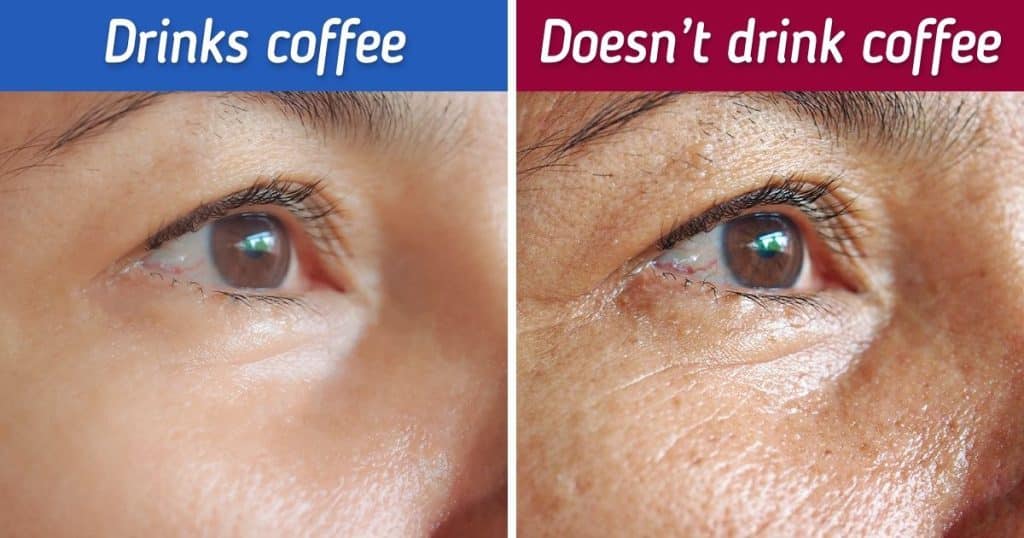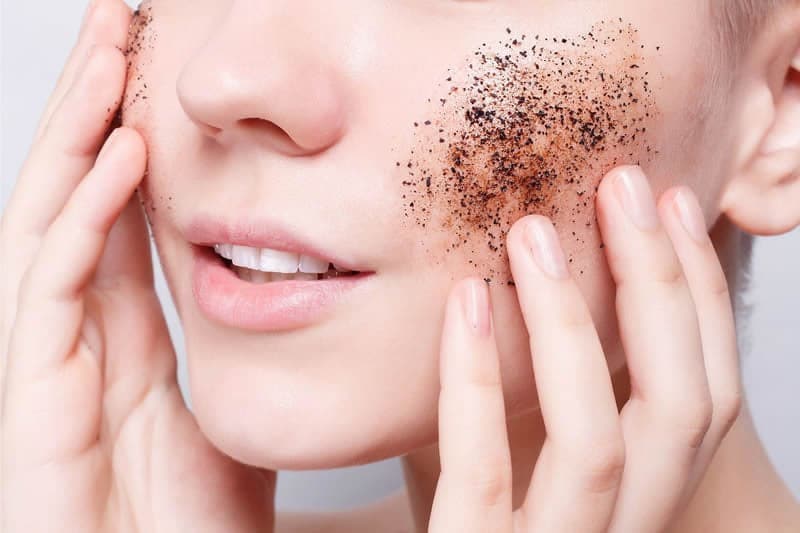Imagine a life without your morning cup of coffee. While the mere thought may send shivers down your spine, what if we told you that quitting coffee could have a positive impact on your skin?
Yes, you read that right! In this article, we will explore the fascinating effects that cutting out coffee can have on your skin.
From reducing acne to improving hydration, prepare to discover the surprising benefits of bidding farewell to your beloved caffeinated companion.
Brace yourself because your skin is in for a delightful surprise!
Changes in Skin Appearance
Decreased inflammation
When you stop drinking coffee, one of the first changes you may notice in your skin is a decrease in inflammation. Coffee is known to contain compounds that can stimulate inflammation in the body, contributing to redness and skin irritation. By eliminating coffee from your routine, your body can reduce its inflammatory response, leading to calmer and less irritated skin.
Improved hydration
Coffee is a diuretic, which increases urine production and can lead to dehydration. Dehydration can hurt your skin, leaving it dry, dull, and prone to fine lines and wrinkles. By cutting out coffee, you reduce the risk of dehydration and improve your skin’s hydration levels. This can result in a more plump and moisturized complexion, giving your skin a healthy and youthful appearance.
Reduced redness and flushing
If you experience redness and flushing in your skin, especially in conditions like rosacea, quitting coffee can positively impact you. Caffeine caffeine can dilate blood vessels and increase blood flow to the skin, leading to redness and flushing. By eliminating coffee, you are reducing the stimulation of blood vessels, resulting in a calmer and less flushed complexion.
Fewer breakouts
Coffee consumption has been linked to an increased risk of acne breakouts. This may be due to the effects of caffeine on the body’s hormonal balance and its ability to stimulate sebum production.
Sebum is an oily substance that can clog pores and contribute to the development of acne. You may experience fewer breakouts and a clearer complexion by cutting out coffee.
Improved skin tone and texture
Quitting coffee can also improve your skin’s tone and texture. Coffee contains acidic compounds that can disrupt the skin’s natural pH balance, leading to a dull and uneven complexion. Additionally, the diuretic effect of coffee can contribute to dryness and roughness in the skin. Removing coffee from your routine allows your skin to restore its natural pH balance and retain moisture, resulting in a more even tone and smoother texture.
Effects on Collagen and Elastin Production
Stimulated collagen synthesis
Collagen is a protein that provides structural support to the skin, making it firm and supple. Studies have shown that caffeine can inhibit collagen synthesis, leading to a loss of elasticity and the formation of fine lines and wrinkles. By quitting coffee, you remove a potential barrier to collagen production, allowing your skin to rebuild and maintain its youthful appearance.
Increased elastin production
Elastin is another protein that contributes to the elasticity and resilience of the skin. Like collagen, caffeine has been found to interfere with elastin production, leading to a loss of elasticity and the development of wrinkles.
When you stop drinking coffee, you are allowing your body to increase elastin production, helping to improve the overall elasticity and firmness of your skin.
Reduced appearance of fine lines and wrinkles
By stimulating collagen synthesis and increasing elastin production, quitting coffee can result in a reduced appearance of fine lines and wrinkles.
The loss of collagen and elastin due to coffee consumption can contribute to the formation of wrinkles and premature aging. By eliminating coffee, you allow your skin to repair and rebuild these essential proteins, leading to smoother and more youthful-looking skin.
Impact on Skin Barrier Function
Enhanced skin barrier function
The skin barrier is a protective layer that helps maintain moisture and keep harmful substances out. Coffee’s diuretic effect can disrupt the skin barrier function, leading to increased water loss and decreased protection against external irritants.
When you stop drinking coffee, your skin’s barrier function can restore and strengthen itself, resulting in better protection and healthier skin.
Improved moisture retention
Dehydration caused by coffee consumption can leave the skin dry and lacking moisture. The skin’s ability to retain moisture is crucial for maintaining health and appearance. By quitting coffee, you minimize the risk of dehydration and allow your skin to retain moisture more effectively. This can result in a plumper and more radiant complexion.
Decreased transepidermal water loss
Transepidermal water loss refers to water evaporation from the skin’s surface. Coffee’s diuretic effect can contribute to increased water loss through the skin, leading to dryness and flakiness.
When you stop drinking coffee, you reduce the water loss through the skin, allowing it to stay hydrated and retain its natural moisture levels. This can lead to a smoother and more supple complexion.
Reduced Caffeine-Induced Dehydration
Improved skin hydration
As mentioned earlier, coffee is a diuretic and can increase urine production, leading to dehydration. Dehydration can have various adverse effects on the skin, including dryness, tightness, and an overall lack of moisture.
By eliminating coffee, you reduce the risk of dehydration and promote better skin hydration. This can result in a more plump and healthy-looking complexion.
Decreased dryness and flakiness
Dryness and flakiness are common symptoms of dehydrated skin. Coffee’s diuretic properties can exacerbate these symptoms by increasing water loss from the body, including the skin.
When you stop drinking coffee, you prevent further dehydration and allow your skin to regain its natural moisture balance. This can lead to a reduction in dryness and flakiness, leaving your skin soft and smooth.
Improved Blood Circulation
Enhanced oxygen and nutrient delivery
Coffee’s caffeine content can increase blood flow and stimulate circulation in the body.
While this can have some positive effects, such as temporarily reducing puffiness and dark circles, excessive caffeine consumption can also lead to overstimulation of blood vessels in the skin, resulting in redness and irritation.
By quitting coffee, you allow your blood circulation to normalize, ensuring optimal oxygen and nutrient delivery to the skin for a healthier and more radiant complexion.
Increased skin radiance
Proper blood circulation is essential for maintaining the skin’s natural radiance. Coffee’s ability to dilate blood vessels can initially give the skin a flushed and glowing appearance.
However, prolonged stimulation of blood vessels can lead to chronic redness and a dull complexion. When you stop drinking coffee, you promote balanced blood circulation, contributing to a more radiant and even-toned complexion.
Effects on Acne and Rosacea
Reduced inflammation and redness
Inflammatory skin conditions like acne and rosacea can be aggravated by coffee consumption. Caffeine’s ability to stimulate blood vessels and increase inflammation in the body can result in heightened redness and irritation in the skin. By eliminating coffee, you are reducing the potential triggers for inflammation, helping to calm and soothe these conditions.
Improved control of acne and rosacea symptoms
Coffee’s impact on hormonal balance and sebum production can contribute to the development and exacerbation of acne and rosacea symptoms.
When you stop drinking coffee, you minimize the potential triggers for these conditions, giving your skin a better chance to heal and regain control. While quitting coffee alone may not eliminate acne and rosacea, it can certainly improve the overall management of symptoms.
Decreased Sensitivity and Irritation
Less reactive skin
Coffee contains various compounds that can be irritating to the skin, especially for those with sensitive skin types.
The caffeine content in coffee can stimulate nerve endings, contributing to a heightened sensitivity and reactivity. By cutting out coffee, you eliminate a potential irritant and make your skin less reactive and more resilient.
Reduced risk of skin irritation
In addition to caffeine, coffee contains other substances that can trigger skin irritation, such as oils and acids. These compounds can disrupt the skin’s natural balance and cause redness, itching, and irritation. When you stop drinking coffee, you are reducing the exposure to these potentially irritating substances, minimizing the risk of skin irritation and promoting a healthier and more comfortable complexion.
Decreased sensitivity to external triggers
Various external factors, such as weather changes, pollution, and certain skincare products, can easily trigger sensitive skin. Coffee’s ability to stimulate nerve endings and increase skin reactivity can make sensitive skin even more susceptible to these triggers. By quitting coffee, you are giving your skin a chance to become less sensitive and reducing its response to external factors, leading to a calmer and more balanced complexion.
Potential Side Effects
Caffeine withdrawal symptoms
Quitting coffee abruptly may result in caffeine withdrawal symptoms. These can include headaches, tiredness, difficulty concentrating, and irritability. These symptoms are temporary and will subside over time as your body adjusts to the absence of caffeine. Patience and giving your body time to adapt during this transition period is essential.
Headaches and fatigue
Headaches and fatigue are common symptoms of caffeine withdrawal. Coffee’s stimulating effect on the nervous system can create dependency, and when this is suddenly removed, it can trigger withdrawal symptoms. Adequate rest and hydration can help alleviate these symptoms as your body adjusts to the absence of caffeine.
Mood changes
Caffeine can have an impact on mood and energy levels. Quitting coffee may temporarily affect your mood as your body adapts to changes in brain chemistry. Being aware of these potential mood changes and practicing self-care during this transition is essential. Engaging in activities that promote relaxation and practicing stress-management techniques can help support your overall well-being.
Tips for Transitioning
Gradually reduce caffeine intake.
To minimize caffeine withdrawal symptoms, it can be helpful to gradually reduce your coffee consumption instead of quitting abruptly. Slowly decreasing the amount of coffee you drink over time allows your body to adjust more smoothly and can help alleviate some withdrawal symptoms.
Stay hydrated
Maintaining proper hydration is crucial during this transition period. Drink plenty of water throughout the day to counteract the diuretic effects of coffee and promote skin hydration. Hydrated skin is more resilient and better able to repair itself.
Implement a skincare routine.
Establishing a consistent skincare routine is essential for maintaining healthy skin. Cleanse, moisturize, and protect your skin daily to keep it in optimal condition.
Choose products suitable for your skin type and address any specific concerns. This routine will help support your skin’s natural healing process and contribute to overall skin health.
Opt for natural alternatives.
If you miss the ritual of having a warm beverage in the morning, consider exploring natural alternatives to coffee. Herbal teas, such as chamomile or green tea, can provide comforting and hydrating options without the adverse effects of caffeine.
These natural alternatives can still offer a pleasant taste and ritual while being gentler on your skin and overall well-being.
Consultation with a Dermatologist
Seek professional advice
If you have specific concerns about your skin or need personalized guidance, it is always beneficial to consult with a dermatologist.
A dermatologist can evaluate your skin condition, provide targeted recommendations, and develop a customized plan to address your needs. They can also monitor your progress and make any necessary adjustments to your skincare routine.
Address specific skin concerns.
A dermatologist can help address specific skin concerns, such as acne, rosacea, or signs of aging. They can recommend suitable treatments and products to target these concerns effectively. By seeking professional advice, you can ensure that you take the most appropriate steps to achieve your desired skin goals.
Develop a personalized plan.
Working with a dermatologist allows you to develop a personalized skincare plan tailored to your needs. They can assess your skin type, identify underlying conditions or sensitivities, and recommend appropriate products and treatments. This personalized approach ensures that you take the best care of your skin and maximize your results.
In conclusion, quitting coffee can significantly impact the overall health and appearance of your skin. From reducing inflammation and breakouts to improving hydration and collagen production, eliminating coffee from your routine can lead to a more precise, smoother, and youthful complexion.
While there may be potential side effects during the transition, practicing self-care and implementing a consistent skincare routine can support your skin’s journey toward better health. If you have specific concerns or require personalized guidance, consulting with a dermatologist can provide expert advice and a customized plan to achieve your skincare goals. Remember, your skin is unique, and taking care of it is a daily commitment that can yield lasting benefits.










































